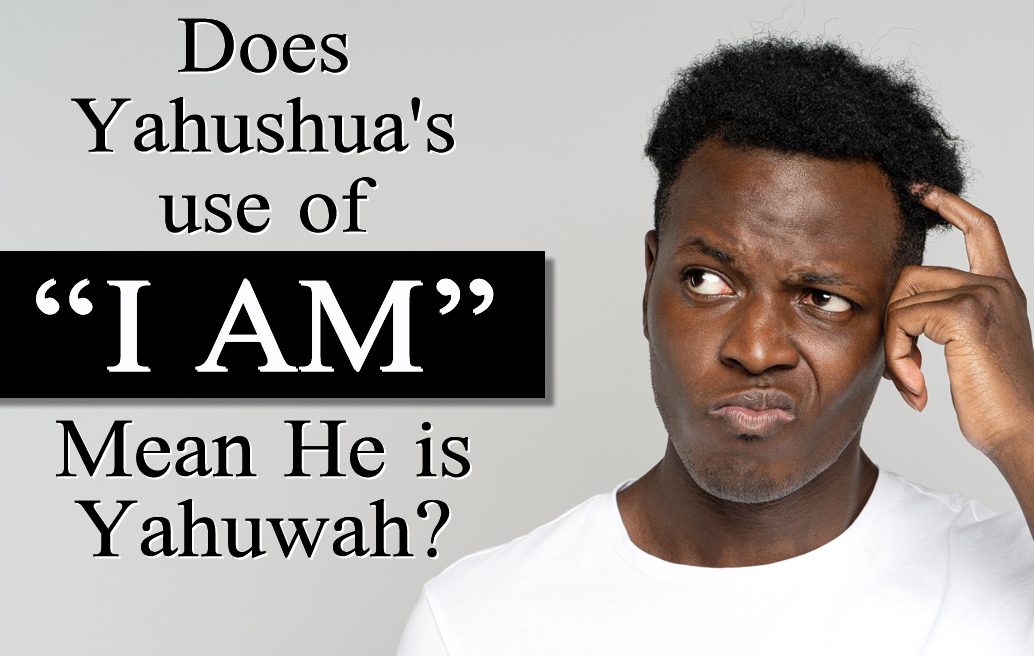
|
This is a non-WLC article. When using resources from outside authors, we only publish the content that is 100% in harmony with the Bible and WLC current biblical beliefs. So such articles can be treated as if coming directly from WLC. We have been greatly blessed by the ministry of many servants of Yahuwah. But we do not advise our members to explore other works by these authors. Such works, we have excluded from publications because they contain errors. Sadly, we have yet to find a ministry that is error-free. If you are shocked by some non-WLC published content [articles/episodes], keep in mind Proverbs 4:18. Our understanding of His truth is evolving, as more light is shed on our pathway. We cherish truth more than life, and seek it wherever it may be found. |

In John 9:9, the miraculously healed but formerly blind man said, “I am,” exactly the same two Greek words that Yahushua uses when he makes his “I am” statements (as recorded throughout the book of John). First, it’s interesting to note that when the blind man says in Greek “ego eimi,” it is usually and correctly translated as “I am he,” referring, of course, to his attempt to clarify to everyone that, “Yes! I am he; I am the one — the formerly blind man, but now I’m healed.” Yet when Yahushua says the same thing precisely in order to identify himself as the Messiah (John 4:26), it’s usually rendered as “I AM”. This in turn is popularly, but quite erroneously, used to support the falsehood that Yahushua was somehow claiming to be Yahuwah, since in the OT Yahuwah said to Moses “I am that I am” (Ex 3.14, literally, “I will be what I will be”).
When Yahushua spoke to the Samaritan woman he was making the stupendous claim to be the Messiah, the Christ of the woman’s declaration in the verse immediately preceding (4:25). Elsewhere in John, Yahushua is recorded as stating that he is the “bread of life” (6:35) and “the resurrection and the life” (11:25). But saying “ego eimi the bread of life” is nothing at all like declaring “I am what I am/I will be what I will be” as said by Yahuwah to Moses (Ex. 3:14).
 Note that it’s not the “ego eimi” of Yahuwah’s self- revelation that is the focus for those who say Yahushua is Yahuwah. The real declaratory focus are the subsequent two words — “o ohn”1 — the Divine identifiers, we might say. In the NIV Yahuwah says to Moses: “I am [ego eimi] who I am [o ohn].” “I am the Self-Existing One.” “This is what you are to say to the Israelites: ‘I am [o ohn] has sent me to you.’” But the English translations highlight the wrong two words, i.e., instead of ego eimi it should be o ohn: “o ohn [the self-existing one] has sent you.” (cp. Philo, Life of Moses, vol. 1.75: “He who is”).
Note that it’s not the “ego eimi” of Yahuwah’s self- revelation that is the focus for those who say Yahushua is Yahuwah. The real declaratory focus are the subsequent two words — “o ohn”1 — the Divine identifiers, we might say. In the NIV Yahuwah says to Moses: “I am [ego eimi] who I am [o ohn].” “I am the Self-Existing One.” “This is what you are to say to the Israelites: ‘I am [o ohn] has sent me to you.’” But the English translations highlight the wrong two words, i.e., instead of ego eimi it should be o ohn: “o ohn [the self-existing one] has sent you.” (cp. Philo, Life of Moses, vol. 1.75: “He who is”).
The NT writers never record Yahushua using “o ohn” in reference to himself, let alone “ego eimi o ohn.” Furthermore, what other words would you have Yahushua use in order to identify himself? For example, when you say “I am a teacher” or “I am Bob” or “I am the only one who has the key to that door,” if you were to write them in Greek the same words would be used as self-identifiers: “ego eimi.” There is no simpler and clearer way to identify you! Yahushua never said “I AM” or “I am that I am” or “I will be what I will be.” He simply said, “I am the good shepherd; I am the way, the truth and the life; I am the vine”; “I am the Messiah” (John 4:25-26), etc. Like the healed blind man, Yahushua was merely identifying himself for those asking or looking for him (compare John 18:4-8).
Yahushua from the beginning claimed to be the promised Messiah. He never claimed to be Yahuwah, the God of Israel (who is also the God of Yahushua!). He never claimed to be “The Great I AM” of the OT. He did, however, repeatedly claim to be the unique Son of Yahuwah, the Messiah lord (Luke 2.11, kristos kurios) and this is not the Lord Yahuwah. Yahushua is related to the One Lord Yahuwah in Luke 2:26 where he is the Lord’s Anointed (Messiah). Luke has brilliantly and precisely introduced the hero and principal “player” of his narrative in the two-volume (Luke and Acts) work he gives us. Luke wrote nearly a third of the NT.
What a blessed achievement! Luke and Yahushua never for a moment believed that there are two who are both God. That would shatter the great commandment, which forbids any multiplying of Yahuwah (Mark 12:29; John 17:3; 5:44; Mal. 2:10). Yahushua rejected the blasphemy of claiming to be YAHUWAH! (John 10:33-36).